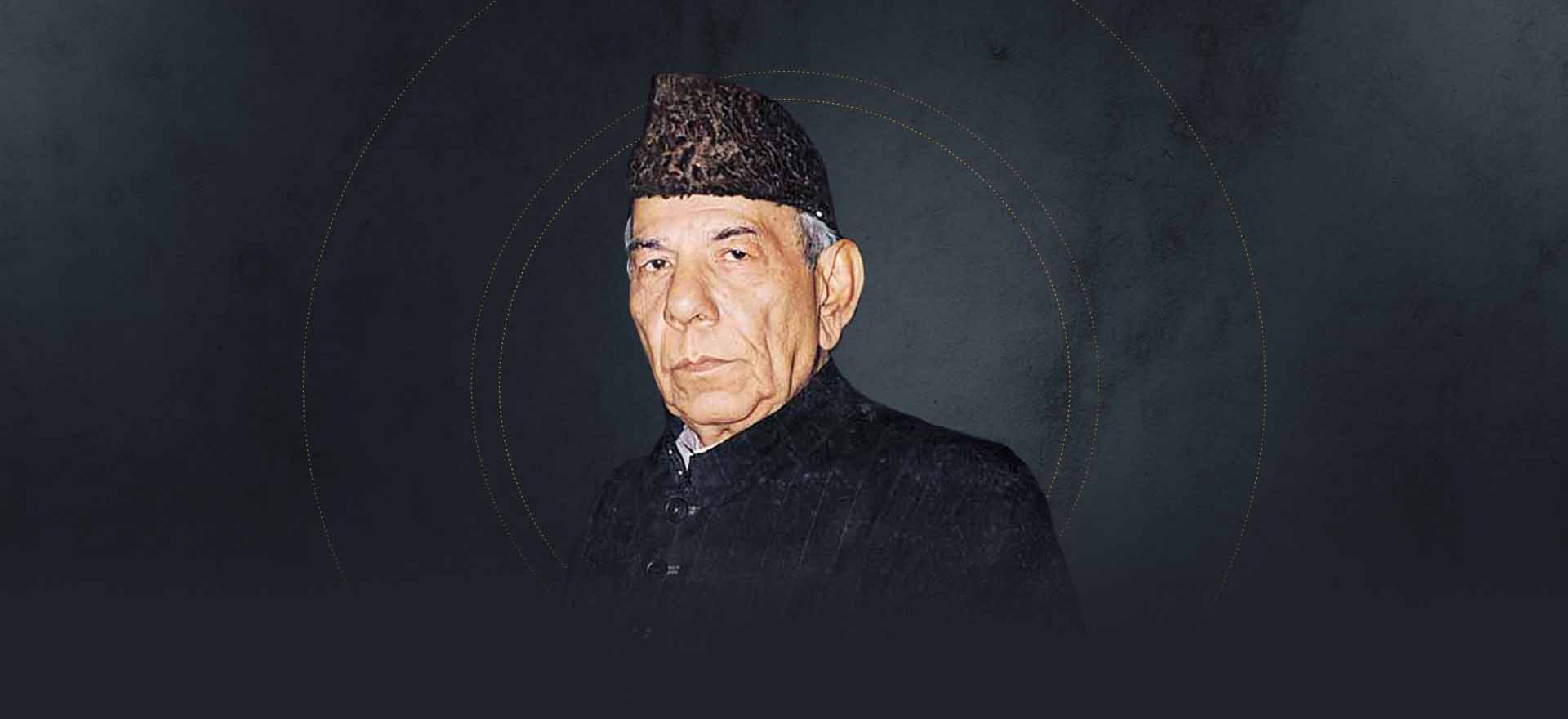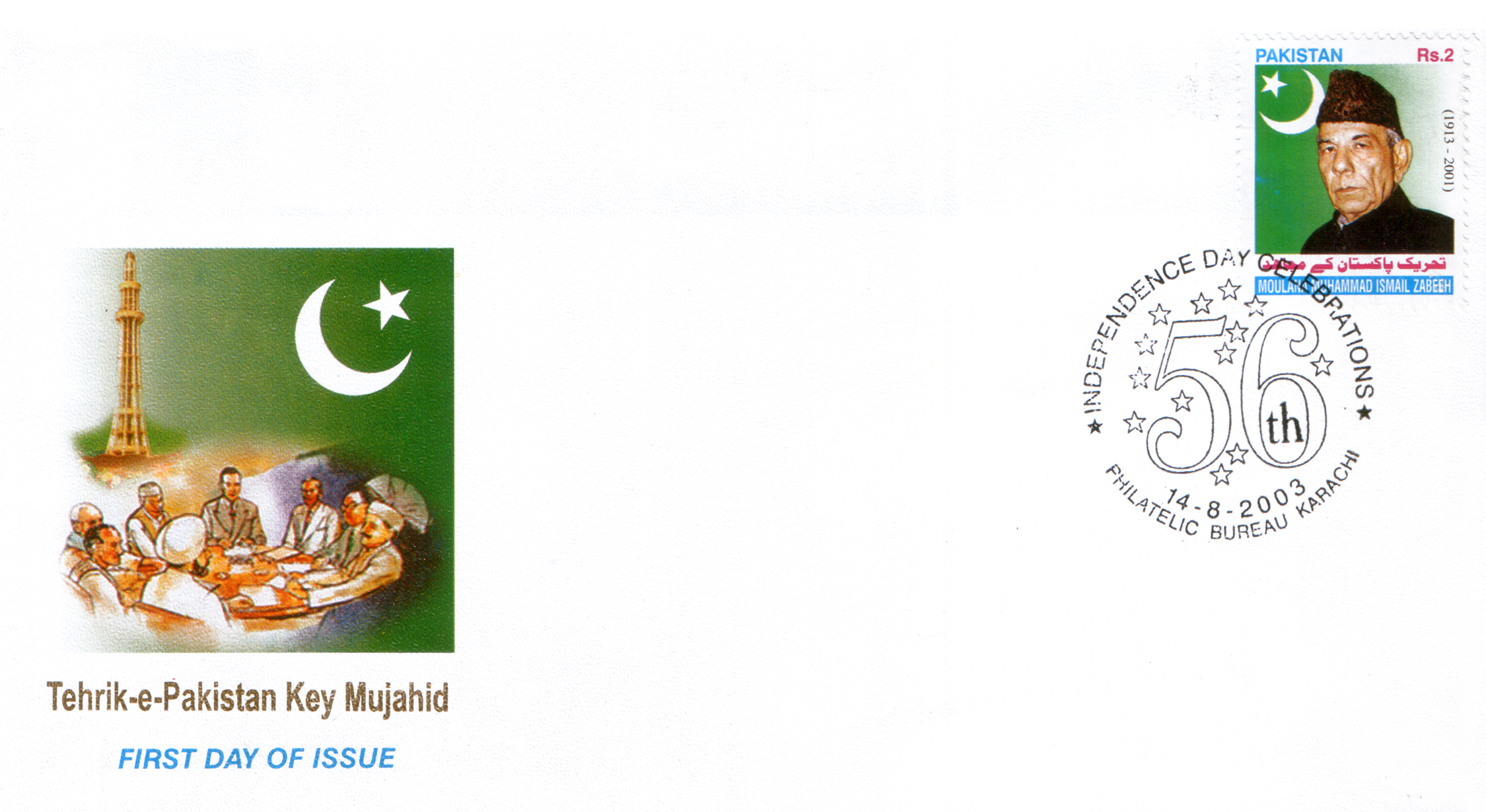
Moulana Muhammad Ismail Zabeeh

Moulana Muhammed lsmail Zabeeh is one of the founding fathers of Pakistan. His whole life is an epitome of total devotion and self less service to the cause of Muslim Ummah and the Pakistan Movement. He was born in 1913 in Gawaliar but was brought up at Kanpur. The Moulana hailed from a well known scholarly family of Hazara.
Biography
H is father Akhundzada Moulana Ghulam Yahya Hazarvi was a great religious scholar who succeeded Moulana Ashraf Thanvi as head of Jamia llahiyat when the latter left Kanpur and settled at Thana Bhawan at the beginning of the 20th century. Moulana Zabeeh studied at Jamia llahiyat Kanpur, Darul-Uloom Deoband and Jamia Milliah Delhi under some of the luminous scholars of that time including Dr. Zakir Hussain.
He entered political life at the tender age of 14 when in 1927 he took active part in “civil disobedience” and anti British “quit-India” movements. He proved to be an outstanding scholar during his young days and authored a few classic treatises on travelogues and religion. He also rendered some of the classic Persian books (i.e"مرقع دہلی"از:نواب درگاہ علی خان،وزیراعظم،دکن ) into Urdu language which were published in 1931 by Khawaja Hasan Nizami’s monthly magazines, “Paishwa” and “Maulvi” at Delhi. He embarked on his singular journalistic career by bringing out from Bombay a humorous periodical “Bombay Punch” in early 1930’s. He then moved to Kanpur and published a literary monthly Urdu magazine, “Arif” which prided in publishing original poetry of Maulana Hasrat Mohani and scholarly writings of Maulana Azad Subhani.
Maulana Zabeeh rose to political eminence in 1930’s when at the young age of 17 he authored a historic report ‘Kanpur Riots’ covering the tragic Kanpur ethnic riots of 1931. This report became a touching saga and an authentic reference to the atrocities committed by the vast Hindu majority toward the Muslim minority of Kanpur.
In 1937 he was the youngest delegate to the All India Muslim League Session at Lucknow. He also remained Publicity Secretary of All India Majlis-e-Ahrar in 1938. Upon arrest of its President Maulana Ataullah Shah Bukhari, Maulana Zabeeh acted as President of All India Majlis-e-Ahrar in 1939.
Maulana Zabeeh was put behind the bars with the top Indian leaders many a time by the British. In 1941, soon after his release from a long spell of jail, he brought out weekly “Quami Akhbar” from Kanpur which was soon to become one of the leading daily newspapers and exerted a formidable influence upon the Muslims of UP in their struggle toward a free homeland. His political sagacity and prodigious journalistic talent was soon to catch the attention of Quaid-e-Azam Muhammad Ali Jinnah who appointed him as the Head of the publicity campaign of the All India Muslim League, UP in the crucial 1946 elections. Due to his extremely effective, persuasive and powerful publicity campaign in favour of Muslim League candidates which he partly financed from his own pocket that Muslim League won almost all the 67 Muslim seats in UP. He was also made Incharge of historic election of Quaid-e-Millat Nawabzada Liaquat Ali Khan from Hapur constituency against formidable Congress candidate Maulana Muhammad Ahmad Kazmi. History has recorded that he conducted Quaid-e-Millat’s election campaign in such an outstanding and forceful manner that the victory of Liaquat Ali Khan became one of the most historic fiats of his electioneering prowess. This election victory proved to be a turning point in Pakistan Movement – a detailed account of this historic campaign is vividly portrayed by (Late) Musarrat Hussain Zubairi [former Federal Secretary Communications, undivided India and subsequently Pakistan] in his autobiography “A Voyage Through History”.
Maulana Zabeeh became a close associate of Quaid-e-Azam whose adoration and association he was to honour all his life through his prolific writings.
After migration in 1947 he, in association with Raees Ahmad Jaffery, started an Urdu daily “Khursheed” from Karachi. In 1949 he brought out the first English newspaper “Voice of Sindh” from Hyderabad. The present Sindh Text Book Board Press at Hyderabad, Sindh was gifted to the Sindh Government by him in 1952 on the explicit request of the then Chief Commissioner, Karachi Mr. Hashim Raza.
On the insistence of his great friend Major General Jahanzeb (Late) the then Ruler of Swat he moved from Hyderabad and settled in Swat in 1953 and authored the first authentic book on Swat titled, “مناظر سوات ”.
He finally settled in 1954 at Peshawar where on the request of his journalist friend Usman Azad (Late) he launched daily “Anjam” of Karachi from his residence at Peshawar. On conversion of Anjam to daily ‘Mashriq’ he acted as its Chief Editor for some time in 1960’s.
One of the most outstanding contributions of Maulana Ismail Zabeeh was that, together with editors Altaf Hussain of ‘Dawn’ and Hameed Nizami of ‘Nawa-i-Waqt’, he convened the first All India Muslim Newspaper Editors Convention at the Arabic College, Delhi which was inaugurated by Quaid-e-Azam and presided by Quaid-e-Millat. In May, 1947. When the Editors Conference shifted to Lahore from Delhi after partition, Hameed Nizami became its first Secretary General. The professional newspaper editors’ body in Pakistan today thus owes its existence largely to the imaginative initiative of Maulana Ismail Zabeeh.
Maulana Zabeeh had spent many years in jail in UP. A huge record of his writings, copies of old newspapers and the publicity material of the Muslim League was all burnt by the UP state government and he was virtually exiled from India by the Congress Government. When he wanted to visit India for offering Fateha at the graves of his parents, he was told that he could never enter India.
His name is abidingly associated with Islamabad. He was among the first Pakistanis to propose the setting up of the nation’s capital in this region and name it as Islamabad. Capital Park F-9 Sector was named after Mohtarma Fatima Jinnah in December, 1995 by the then Prime Minister of Pakistan on the behest and insistence of Maulana Ismail Zabeeh. Due to the untiring efforts of Maulana Zabeeh to keep the memories of the freedom fighters alive in the minds of the present and future generations numerous roads have been dedicated after the Pioneers of Pakistan Movement.
Maulana Ismail Zabeeh never yearned for any worldly reward. He never asked for any personal favour from any government. He found it unbearable to live under the obligation of others.
Whenever the dignitaries including heads of the State and the Government called on him at his residence they would always be carried by the depth of his intellect, unflinching loyalty to Pakistan ideology and the Quaid and his abiding concern for the common man.
Maulana Ismail Zabeeh authored several books, including a travelogue on Afghanistan and remained an important figure in Pakistan’s intellectual circles. His voluminous books “ اسلام آباد- منزل مراد، ماضی، حال، مستقبل (ii)” “ اسلام آباد- تاریخ، تعمیر، اور شمالی علاقے (i)” are considered rare and authentic pieces of research on a city (i.e. Islamabad) he helped select as the capital of Pakistan. He wrote many books of literary and historic significance such as:
قرآن کریم کے انقلابی فیصلے (i)
برصغیر میں مسلمانوں کے عروج و زوال کا آئینہ (ii)
ارتھ شاستر آچاریہ کوتلیہ چانکیہ کی رموز سیاست و حکمرانی (iii)
Maulana Zabeeh died on 27 September, 2001 at Islamabad where he had settled for the last 10 years, after a protracted illness spanning over a decade, and was laid to rest at Islamabad main graveyard. Pakistan Television, leading social, and literary associations held country wide references in the memory of this great freedom fighter. Almost all the leading newspapers published editorials on the life and achievements of Maulana. According to the editorial carried by daily “The Nation” of September 29, 2001: “Maulana Ismail Zabeeh’s death will be widely mourned, for in him we have not only lost an important writer and researcher, but also one who worked in close proximity with the Quaid-e-Azam, and who was a witness to the thoughts, principles and political practices that we greatly miss in the present socio-political milieu. His life, on the other hand, needs to be honoured and emulated because at the end of the day, he left this world much richer by his valuable research and intellectual legacy, than when he entered in nearly nine decades earlier”.
Moulana Zabeeh was awarded Tehreek-e-Pakistan Gold Medal to honor his selfless contributions. A Commemorative Postage Stamp was also issued on him on August, 14, 2003. Ismail Zabeeh Road in F-8 Sector has also been named in his honor by the Federal Government.

